Analysis of Legal and Ethical Issues in Business Contracts
VerifiedAdded on 2022/09/12
|8
|2015
|12
Report
AI Summary
This report analyzes a case study involving legal and ethical issues in business, specifically concerning an advertisement. It explores the key legal factors, including contract validity, ethical considerations, and the legality of the advertisement. The report delves into the four elements of a valid contract – offer, acceptance, consideration, and legality – and how they apply to the case. It explains the objective theory of contracts and its relevance, discussing why the court deemed the agreement invalid. Furthermore, it differentiates the case from a reward situation involving a unilateral contract and concludes with recommendations for businesses regarding advertising practices, emphasizing the importance of legal compliance and ethical conduct. The report references various sources to support its analysis.

Running head: MANAGEMENT 1
Internation legal and ethical issues in business
Student Name
Institution
Internation legal and ethical issues in business
Student Name
Institution
Paraphrase This Document
Need a fresh take? Get an instant paraphrase of this document with our AI Paraphraser
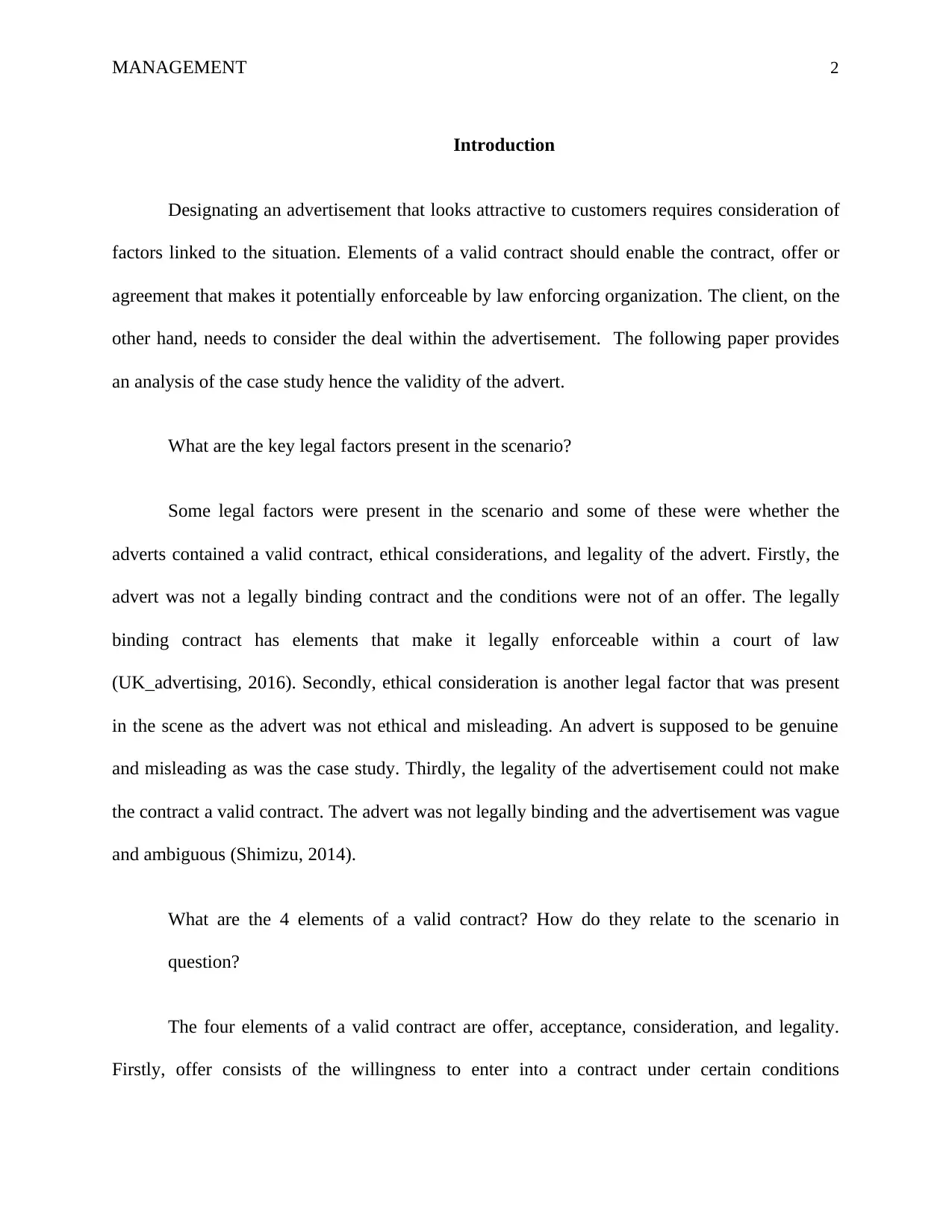
MANAGEMENT 2
Introduction
Designating an advertisement that looks attractive to customers requires consideration of
factors linked to the situation. Elements of a valid contract should enable the contract, offer or
agreement that makes it potentially enforceable by law enforcing organization. The client, on the
other hand, needs to consider the deal within the advertisement. The following paper provides
an analysis of the case study hence the validity of the advert.
What are the key legal factors present in the scenario?
Some legal factors were present in the scenario and some of these were whether the
adverts contained a valid contract, ethical considerations, and legality of the advert. Firstly, the
advert was not a legally binding contract and the conditions were not of an offer. The legally
binding contract has elements that make it legally enforceable within a court of law
(UK_advertising, 2016). Secondly, ethical consideration is another legal factor that was present
in the scene as the advert was not ethical and misleading. An advert is supposed to be genuine
and misleading as was the case study. Thirdly, the legality of the advertisement could not make
the contract a valid contract. The advert was not legally binding and the advertisement was vague
and ambiguous (Shimizu, 2014).
What are the 4 elements of a valid contract? How do they relate to the scenario in
question?
The four elements of a valid contract are offer, acceptance, consideration, and legality.
Firstly, offer consists of the willingness to enter into a contract under certain conditions
Introduction
Designating an advertisement that looks attractive to customers requires consideration of
factors linked to the situation. Elements of a valid contract should enable the contract, offer or
agreement that makes it potentially enforceable by law enforcing organization. The client, on the
other hand, needs to consider the deal within the advertisement. The following paper provides
an analysis of the case study hence the validity of the advert.
What are the key legal factors present in the scenario?
Some legal factors were present in the scenario and some of these were whether the
adverts contained a valid contract, ethical considerations, and legality of the advert. Firstly, the
advert was not a legally binding contract and the conditions were not of an offer. The legally
binding contract has elements that make it legally enforceable within a court of law
(UK_advertising, 2016). Secondly, ethical consideration is another legal factor that was present
in the scene as the advert was not ethical and misleading. An advert is supposed to be genuine
and misleading as was the case study. Thirdly, the legality of the advertisement could not make
the contract a valid contract. The advert was not legally binding and the advertisement was vague
and ambiguous (Shimizu, 2014).
What are the 4 elements of a valid contract? How do they relate to the scenario in
question?
The four elements of a valid contract are offer, acceptance, consideration, and legality.
Firstly, offer consists of the willingness to enter into a contract under certain conditions
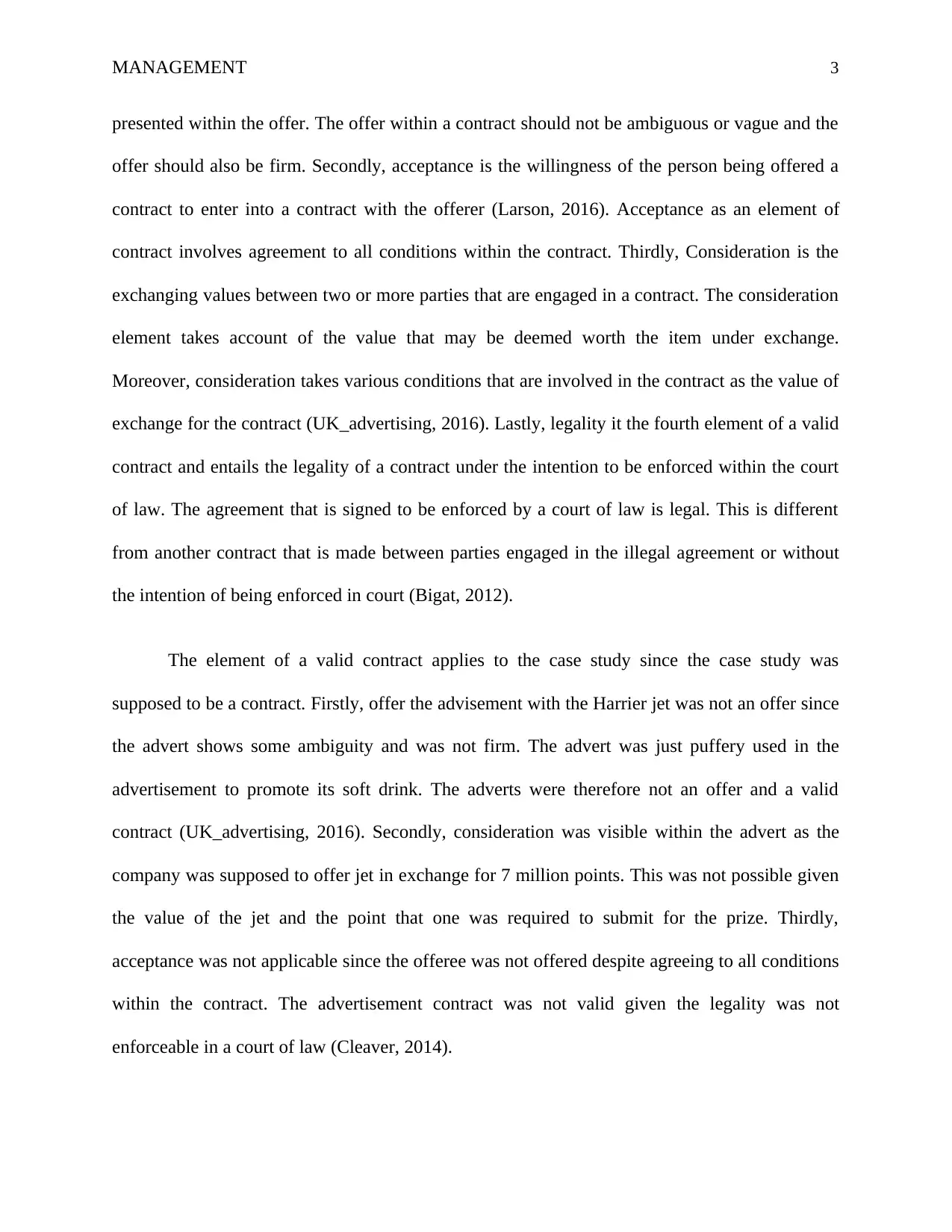
MANAGEMENT 3
presented within the offer. The offer within a contract should not be ambiguous or vague and the
offer should also be firm. Secondly, acceptance is the willingness of the person being offered a
contract to enter into a contract with the offerer (Larson, 2016). Acceptance as an element of
contract involves agreement to all conditions within the contract. Thirdly, Consideration is the
exchanging values between two or more parties that are engaged in a contract. The consideration
element takes account of the value that may be deemed worth the item under exchange.
Moreover, consideration takes various conditions that are involved in the contract as the value of
exchange for the contract (UK_advertising, 2016). Lastly, legality it the fourth element of a valid
contract and entails the legality of a contract under the intention to be enforced within the court
of law. The agreement that is signed to be enforced by a court of law is legal. This is different
from another contract that is made between parties engaged in the illegal agreement or without
the intention of being enforced in court (Bigat, 2012).
The element of a valid contract applies to the case study since the case study was
supposed to be a contract. Firstly, offer the advisement with the Harrier jet was not an offer since
the advert shows some ambiguity and was not firm. The advert was just puffery used in the
advertisement to promote its soft drink. The adverts were therefore not an offer and a valid
contract (UK_advertising, 2016). Secondly, consideration was visible within the advert as the
company was supposed to offer jet in exchange for 7 million points. This was not possible given
the value of the jet and the point that one was required to submit for the prize. Thirdly,
acceptance was not applicable since the offeree was not offered despite agreeing to all conditions
within the contract. The advertisement contract was not valid given the legality was not
enforceable in a court of law (Cleaver, 2014).
presented within the offer. The offer within a contract should not be ambiguous or vague and the
offer should also be firm. Secondly, acceptance is the willingness of the person being offered a
contract to enter into a contract with the offerer (Larson, 2016). Acceptance as an element of
contract involves agreement to all conditions within the contract. Thirdly, Consideration is the
exchanging values between two or more parties that are engaged in a contract. The consideration
element takes account of the value that may be deemed worth the item under exchange.
Moreover, consideration takes various conditions that are involved in the contract as the value of
exchange for the contract (UK_advertising, 2016). Lastly, legality it the fourth element of a valid
contract and entails the legality of a contract under the intention to be enforced within the court
of law. The agreement that is signed to be enforced by a court of law is legal. This is different
from another contract that is made between parties engaged in the illegal agreement or without
the intention of being enforced in court (Bigat, 2012).
The element of a valid contract applies to the case study since the case study was
supposed to be a contract. Firstly, offer the advisement with the Harrier jet was not an offer since
the advert shows some ambiguity and was not firm. The advert was just puffery used in the
advertisement to promote its soft drink. The adverts were therefore not an offer and a valid
contract (UK_advertising, 2016). Secondly, consideration was visible within the advert as the
company was supposed to offer jet in exchange for 7 million points. This was not possible given
the value of the jet and the point that one was required to submit for the prize. Thirdly,
acceptance was not applicable since the offeree was not offered despite agreeing to all conditions
within the contract. The advertisement contract was not valid given the legality was not
enforceable in a court of law (Cleaver, 2014).
⊘ This is a preview!⊘
Do you want full access?
Subscribe today to unlock all pages.

Trusted by 1+ million students worldwide
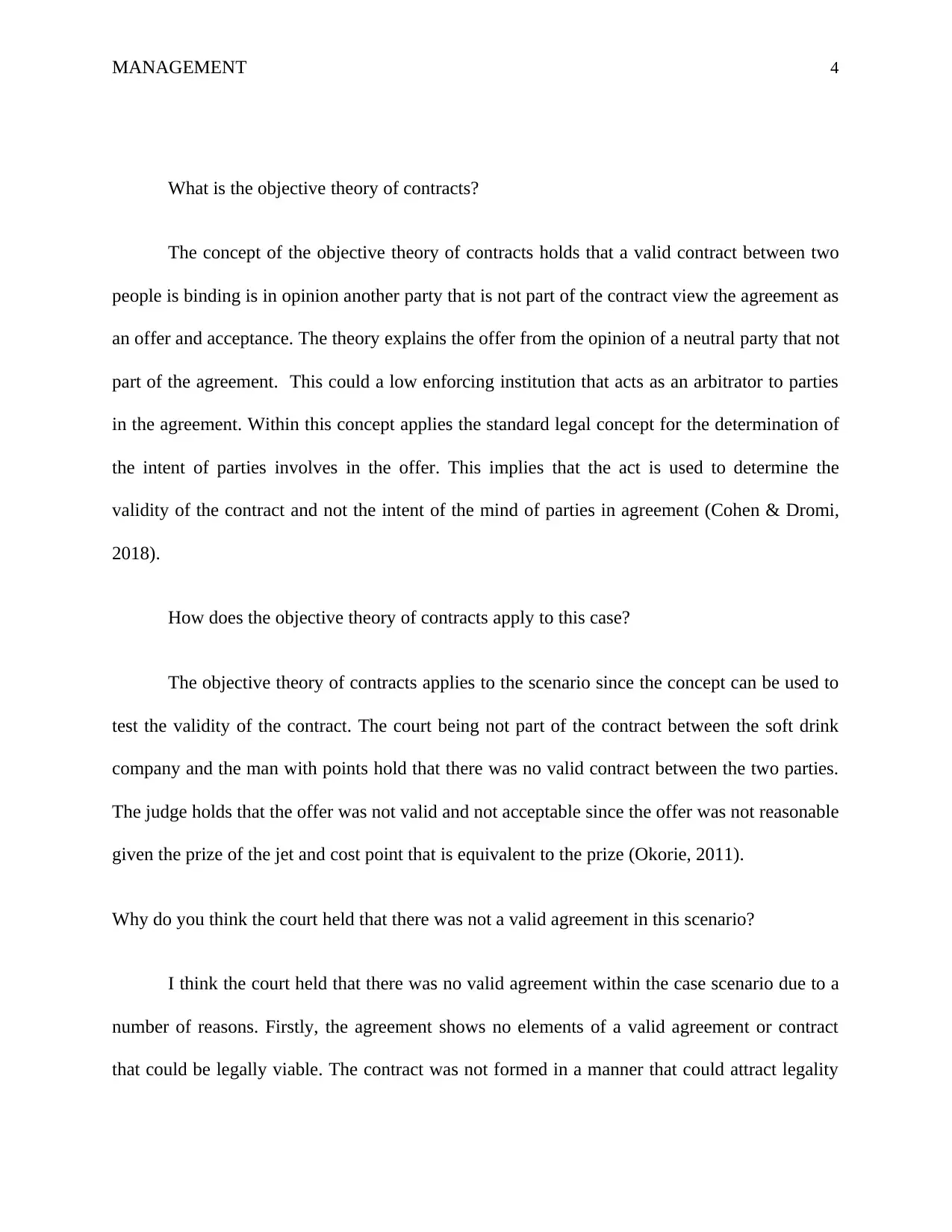
MANAGEMENT 4
What is the objective theory of contracts?
The concept of the objective theory of contracts holds that a valid contract between two
people is binding is in opinion another party that is not part of the contract view the agreement as
an offer and acceptance. The theory explains the offer from the opinion of a neutral party that not
part of the agreement. This could a low enforcing institution that acts as an arbitrator to parties
in the agreement. Within this concept applies the standard legal concept for the determination of
the intent of parties involves in the offer. This implies that the act is used to determine the
validity of the contract and not the intent of the mind of parties in agreement (Cohen & Dromi,
2018).
How does the objective theory of contracts apply to this case?
The objective theory of contracts applies to the scenario since the concept can be used to
test the validity of the contract. The court being not part of the contract between the soft drink
company and the man with points hold that there was no valid contract between the two parties.
The judge holds that the offer was not valid and not acceptable since the offer was not reasonable
given the prize of the jet and cost point that is equivalent to the prize (Okorie, 2011).
Why do you think the court held that there was not a valid agreement in this scenario?
I think the court held that there was no valid agreement within the case scenario due to a
number of reasons. Firstly, the agreement shows no elements of a valid agreement or contract
that could be legally viable. The contract was not formed in a manner that could attract legality
What is the objective theory of contracts?
The concept of the objective theory of contracts holds that a valid contract between two
people is binding is in opinion another party that is not part of the contract view the agreement as
an offer and acceptance. The theory explains the offer from the opinion of a neutral party that not
part of the agreement. This could a low enforcing institution that acts as an arbitrator to parties
in the agreement. Within this concept applies the standard legal concept for the determination of
the intent of parties involves in the offer. This implies that the act is used to determine the
validity of the contract and not the intent of the mind of parties in agreement (Cohen & Dromi,
2018).
How does the objective theory of contracts apply to this case?
The objective theory of contracts applies to the scenario since the concept can be used to
test the validity of the contract. The court being not part of the contract between the soft drink
company and the man with points hold that there was no valid contract between the two parties.
The judge holds that the offer was not valid and not acceptable since the offer was not reasonable
given the prize of the jet and cost point that is equivalent to the prize (Okorie, 2011).
Why do you think the court held that there was not a valid agreement in this scenario?
I think the court held that there was no valid agreement within the case scenario due to a
number of reasons. Firstly, the agreement shows no elements of a valid agreement or contract
that could be legally viable. The contract was not formed in a manner that could attract legality
Paraphrase This Document
Need a fresh take? Get an instant paraphrase of this document with our AI Paraphraser
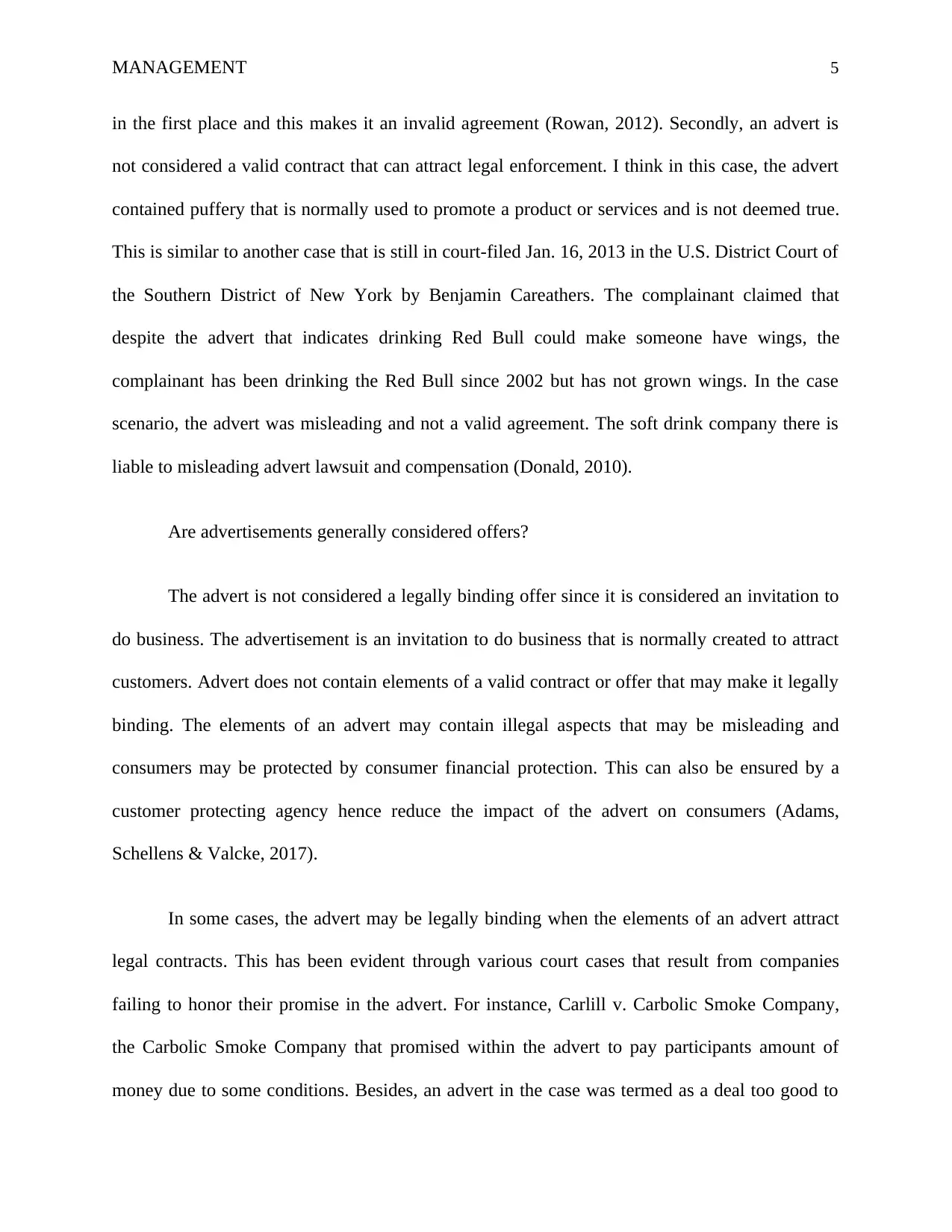
MANAGEMENT 5
in the first place and this makes it an invalid agreement (Rowan, 2012). Secondly, an advert is
not considered a valid contract that can attract legal enforcement. I think in this case, the advert
contained puffery that is normally used to promote a product or services and is not deemed true.
This is similar to another case that is still in court-filed Jan. 16, 2013 in the U.S. District Court of
the Southern District of New York by Benjamin Careathers. The complainant claimed that
despite the advert that indicates drinking Red Bull could make someone have wings, the
complainant has been drinking the Red Bull since 2002 but has not grown wings. In the case
scenario, the advert was misleading and not a valid agreement. The soft drink company there is
liable to misleading advert lawsuit and compensation (Donald, 2010).
Are advertisements generally considered offers?
The advert is not considered a legally binding offer since it is considered an invitation to
do business. The advertisement is an invitation to do business that is normally created to attract
customers. Advert does not contain elements of a valid contract or offer that may make it legally
binding. The elements of an advert may contain illegal aspects that may be misleading and
consumers may be protected by consumer financial protection. This can also be ensured by a
customer protecting agency hence reduce the impact of the advert on consumers (Adams,
Schellens & Valcke, 2017).
In some cases, the advert may be legally binding when the elements of an advert attract
legal contracts. This has been evident through various court cases that result from companies
failing to honor their promise in the advert. For instance, Carlill v. Carbolic Smoke Company,
the Carbolic Smoke Company that promised within the advert to pay participants amount of
money due to some conditions. Besides, an advert in the case was termed as a deal too good to
in the first place and this makes it an invalid agreement (Rowan, 2012). Secondly, an advert is
not considered a valid contract that can attract legal enforcement. I think in this case, the advert
contained puffery that is normally used to promote a product or services and is not deemed true.
This is similar to another case that is still in court-filed Jan. 16, 2013 in the U.S. District Court of
the Southern District of New York by Benjamin Careathers. The complainant claimed that
despite the advert that indicates drinking Red Bull could make someone have wings, the
complainant has been drinking the Red Bull since 2002 but has not grown wings. In the case
scenario, the advert was misleading and not a valid agreement. The soft drink company there is
liable to misleading advert lawsuit and compensation (Donald, 2010).
Are advertisements generally considered offers?
The advert is not considered a legally binding offer since it is considered an invitation to
do business. The advertisement is an invitation to do business that is normally created to attract
customers. Advert does not contain elements of a valid contract or offer that may make it legally
binding. The elements of an advert may contain illegal aspects that may be misleading and
consumers may be protected by consumer financial protection. This can also be ensured by a
customer protecting agency hence reduce the impact of the advert on consumers (Adams,
Schellens & Valcke, 2017).
In some cases, the advert may be legally binding when the elements of an advert attract
legal contracts. This has been evident through various court cases that result from companies
failing to honor their promise in the advert. For instance, Carlill v. Carbolic Smoke Company,
the Carbolic Smoke Company that promised within the advert to pay participants amount of
money due to some conditions. Besides, an advert in the case was termed as a deal too good to
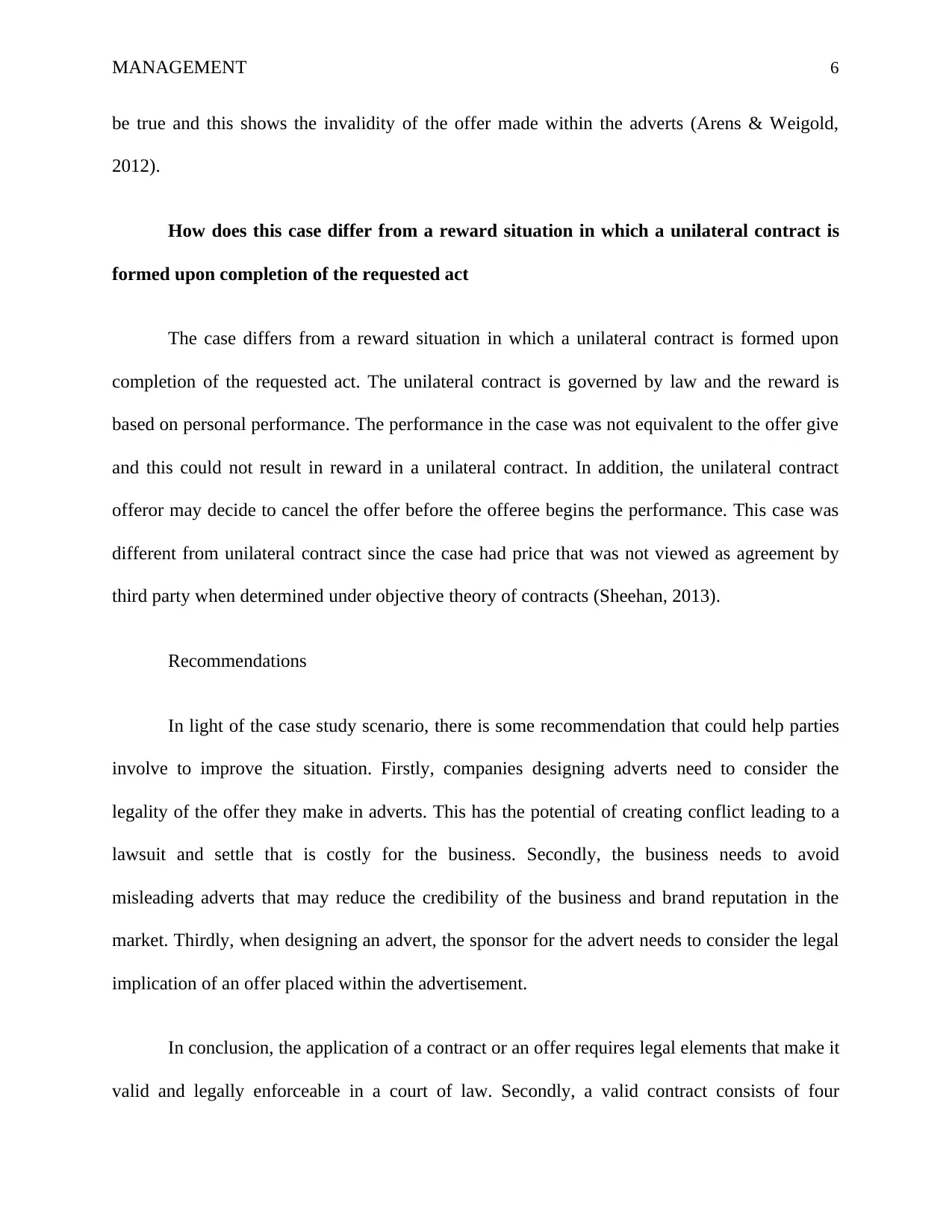
MANAGEMENT 6
be true and this shows the invalidity of the offer made within the adverts (Arens & Weigold,
2012).
How does this case differ from a reward situation in which a unilateral contract is
formed upon completion of the requested act
The case differs from a reward situation in which a unilateral contract is formed upon
completion of the requested act. The unilateral contract is governed by law and the reward is
based on personal performance. The performance in the case was not equivalent to the offer give
and this could not result in reward in a unilateral contract. In addition, the unilateral contract
offeror may decide to cancel the offer before the offeree begins the performance. This case was
different from unilateral contract since the case had price that was not viewed as agreement by
third party when determined under objective theory of contracts (Sheehan, 2013).
Recommendations
In light of the case study scenario, there is some recommendation that could help parties
involve to improve the situation. Firstly, companies designing adverts need to consider the
legality of the offer they make in adverts. This has the potential of creating conflict leading to a
lawsuit and settle that is costly for the business. Secondly, the business needs to avoid
misleading adverts that may reduce the credibility of the business and brand reputation in the
market. Thirdly, when designing an advert, the sponsor for the advert needs to consider the legal
implication of an offer placed within the advertisement.
In conclusion, the application of a contract or an offer requires legal elements that make it
valid and legally enforceable in a court of law. Secondly, a valid contract consists of four
be true and this shows the invalidity of the offer made within the adverts (Arens & Weigold,
2012).
How does this case differ from a reward situation in which a unilateral contract is
formed upon completion of the requested act
The case differs from a reward situation in which a unilateral contract is formed upon
completion of the requested act. The unilateral contract is governed by law and the reward is
based on personal performance. The performance in the case was not equivalent to the offer give
and this could not result in reward in a unilateral contract. In addition, the unilateral contract
offeror may decide to cancel the offer before the offeree begins the performance. This case was
different from unilateral contract since the case had price that was not viewed as agreement by
third party when determined under objective theory of contracts (Sheehan, 2013).
Recommendations
In light of the case study scenario, there is some recommendation that could help parties
involve to improve the situation. Firstly, companies designing adverts need to consider the
legality of the offer they make in adverts. This has the potential of creating conflict leading to a
lawsuit and settle that is costly for the business. Secondly, the business needs to avoid
misleading adverts that may reduce the credibility of the business and brand reputation in the
market. Thirdly, when designing an advert, the sponsor for the advert needs to consider the legal
implication of an offer placed within the advertisement.
In conclusion, the application of a contract or an offer requires legal elements that make it
valid and legally enforceable in a court of law. Secondly, a valid contract consists of four
⊘ This is a preview!⊘
Do you want full access?
Subscribe today to unlock all pages.

Trusted by 1+ million students worldwide
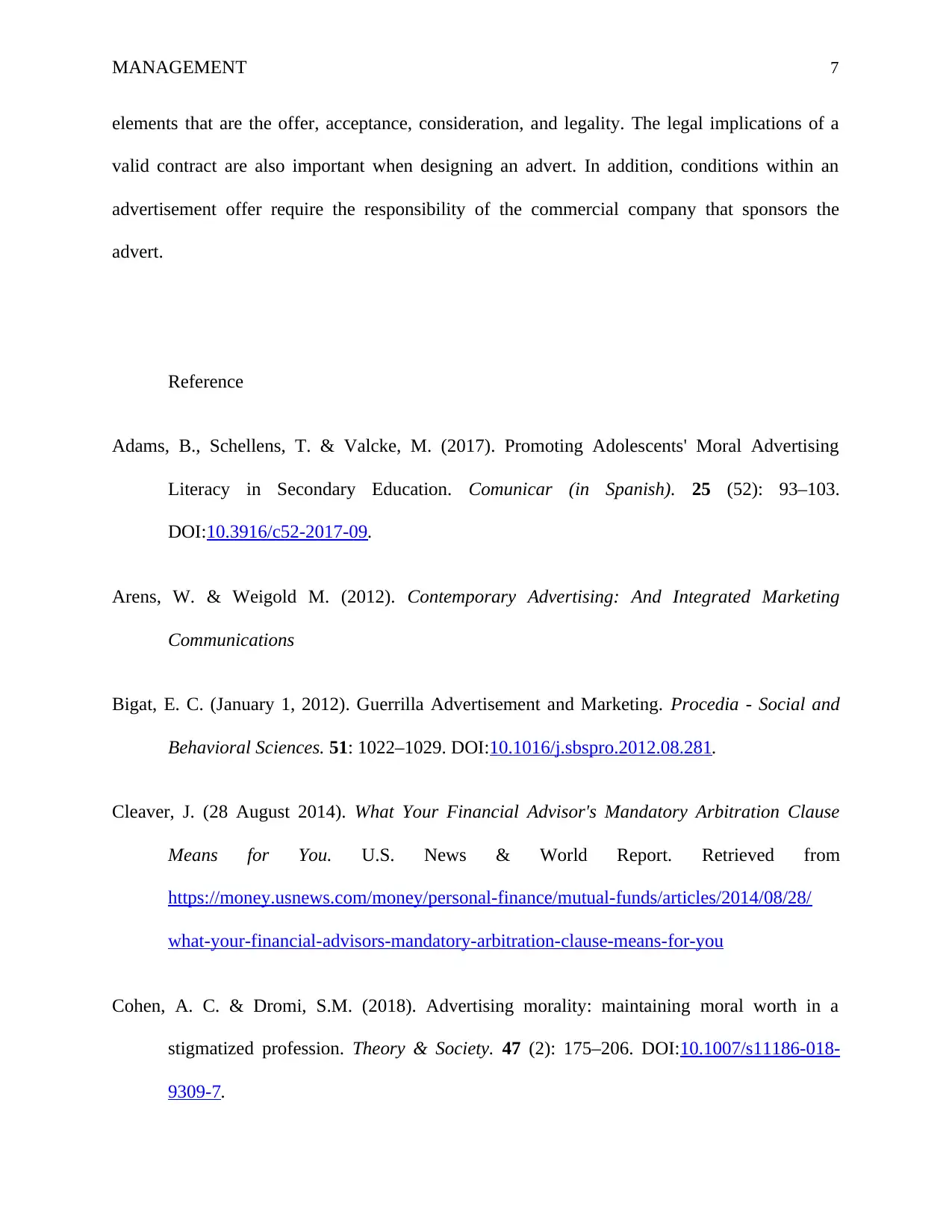
MANAGEMENT 7
elements that are the offer, acceptance, consideration, and legality. The legal implications of a
valid contract are also important when designing an advert. In addition, conditions within an
advertisement offer require the responsibility of the commercial company that sponsors the
advert.
Reference
Adams, B., Schellens, T. & Valcke, M. (2017). Promoting Adolescents' Moral Advertising
Literacy in Secondary Education. Comunicar (in Spanish). 25 (52): 93–103.
DOI:10.3916/c52-2017-09.
Arens, W. & Weigold M. (2012). Contemporary Advertising: And Integrated Marketing
Communications
Bigat, E. C. (January 1, 2012). Guerrilla Advertisement and Marketing. Procedia - Social and
Behavioral Sciences. 51: 1022–1029. DOI:10.1016/j.sbspro.2012.08.281.
Cleaver, J. (28 August 2014). What Your Financial Advisor's Mandatory Arbitration Clause
Means for You. U.S. News & World Report. Retrieved from
https://money.usnews.com/money/personal-finance/mutual-funds/articles/2014/08/28/
what-your-financial-advisors-mandatory-arbitration-clause-means-for-you
Cohen, A. C. & Dromi, S.M. (2018). Advertising morality: maintaining moral worth in a
stigmatized profession. Theory & Society. 47 (2): 175–206. DOI:10.1007/s11186-018-
9309-7.
elements that are the offer, acceptance, consideration, and legality. The legal implications of a
valid contract are also important when designing an advert. In addition, conditions within an
advertisement offer require the responsibility of the commercial company that sponsors the
advert.
Reference
Adams, B., Schellens, T. & Valcke, M. (2017). Promoting Adolescents' Moral Advertising
Literacy in Secondary Education. Comunicar (in Spanish). 25 (52): 93–103.
DOI:10.3916/c52-2017-09.
Arens, W. & Weigold M. (2012). Contemporary Advertising: And Integrated Marketing
Communications
Bigat, E. C. (January 1, 2012). Guerrilla Advertisement and Marketing. Procedia - Social and
Behavioral Sciences. 51: 1022–1029. DOI:10.1016/j.sbspro.2012.08.281.
Cleaver, J. (28 August 2014). What Your Financial Advisor's Mandatory Arbitration Clause
Means for You. U.S. News & World Report. Retrieved from
https://money.usnews.com/money/personal-finance/mutual-funds/articles/2014/08/28/
what-your-financial-advisors-mandatory-arbitration-clause-means-for-you
Cohen, A. C. & Dromi, S.M. (2018). Advertising morality: maintaining moral worth in a
stigmatized profession. Theory & Society. 47 (2): 175–206. DOI:10.1007/s11186-018-
9309-7.
Paraphrase This Document
Need a fresh take? Get an instant paraphrase of this document with our AI Paraphraser
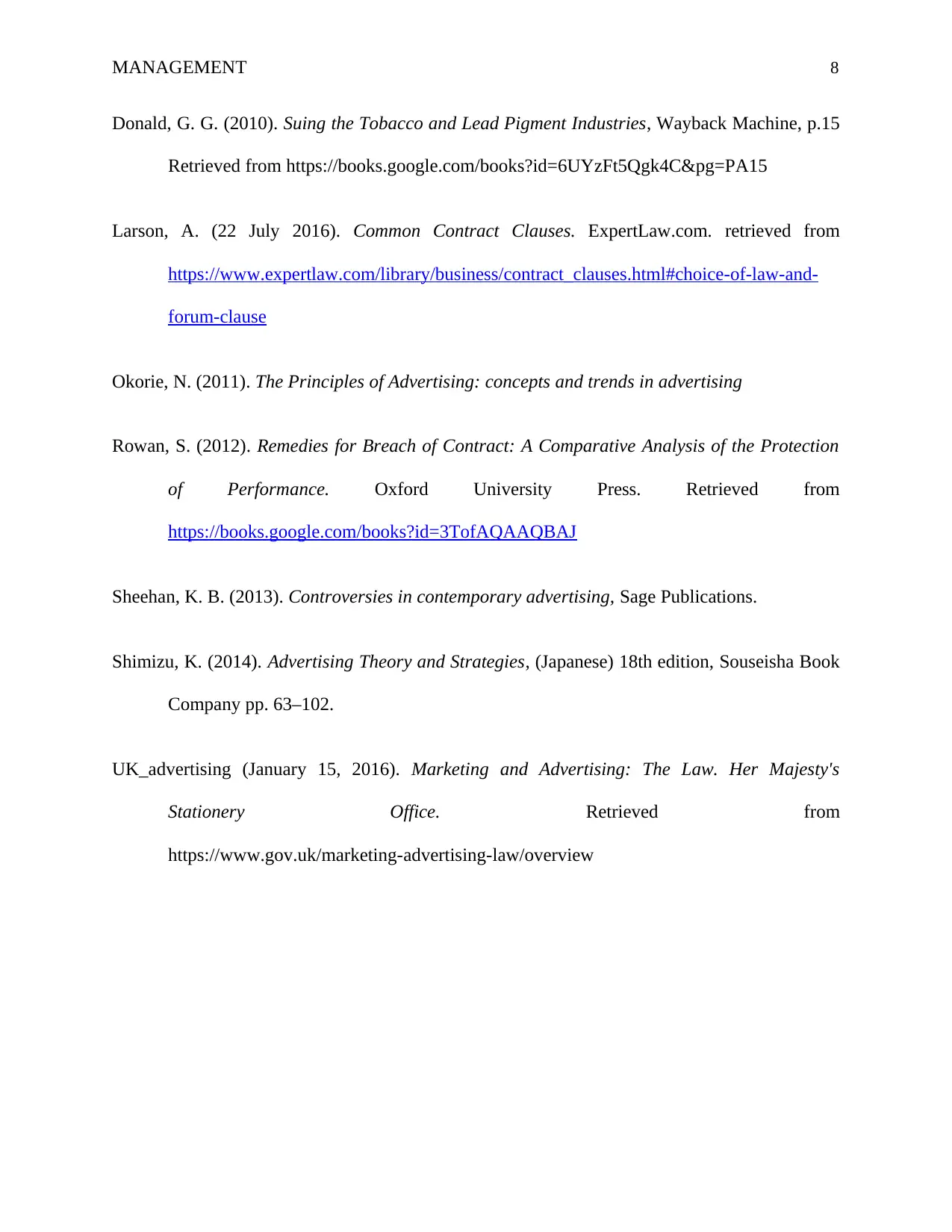
MANAGEMENT 8
Donald, G. G. (2010). Suing the Tobacco and Lead Pigment Industries, Wayback Machine, p.15
Retrieved from https://books.google.com/books?id=6UYzFt5Qgk4C&pg=PA15
Larson, A. (22 July 2016). Common Contract Clauses. ExpertLaw.com. retrieved from
https://www.expertlaw.com/library/business/contract_clauses.html#choice-of-law-and-
forum-clause
Okorie, N. (2011). The Principles of Advertising: concepts and trends in advertising
Rowan, S. (2012). Remedies for Breach of Contract: A Comparative Analysis of the Protection
of Performance. Oxford University Press. Retrieved from
https://books.google.com/books?id=3TofAQAAQBAJ
Sheehan, K. B. (2013). Controversies in contemporary advertising, Sage Publications.
Shimizu, K. (2014). Advertising Theory and Strategies, (Japanese) 18th edition, Souseisha Book
Company pp. 63–102.
UK_advertising (January 15, 2016). Marketing and Advertising: The Law. Her Majesty's
Stationery Office. Retrieved from
https://www.gov.uk/marketing-advertising-law/overview
Donald, G. G. (2010). Suing the Tobacco and Lead Pigment Industries, Wayback Machine, p.15
Retrieved from https://books.google.com/books?id=6UYzFt5Qgk4C&pg=PA15
Larson, A. (22 July 2016). Common Contract Clauses. ExpertLaw.com. retrieved from
https://www.expertlaw.com/library/business/contract_clauses.html#choice-of-law-and-
forum-clause
Okorie, N. (2011). The Principles of Advertising: concepts and trends in advertising
Rowan, S. (2012). Remedies for Breach of Contract: A Comparative Analysis of the Protection
of Performance. Oxford University Press. Retrieved from
https://books.google.com/books?id=3TofAQAAQBAJ
Sheehan, K. B. (2013). Controversies in contemporary advertising, Sage Publications.
Shimizu, K. (2014). Advertising Theory and Strategies, (Japanese) 18th edition, Souseisha Book
Company pp. 63–102.
UK_advertising (January 15, 2016). Marketing and Advertising: The Law. Her Majesty's
Stationery Office. Retrieved from
https://www.gov.uk/marketing-advertising-law/overview
1 out of 8
Related Documents
Your All-in-One AI-Powered Toolkit for Academic Success.
+13062052269
info@desklib.com
Available 24*7 on WhatsApp / Email
![[object Object]](/_next/static/media/star-bottom.7253800d.svg)
Unlock your academic potential
Copyright © 2020–2026 A2Z Services. All Rights Reserved. Developed and managed by ZUCOL.





